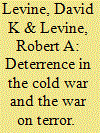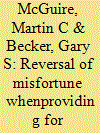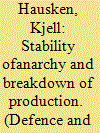| Srl | Item |
| 1 |
ID:
075805


|
|
|
|
|
| Publication |
2006.
|
| Summary/Abstract |
examine the determinants of conflict and settlement by embedding probabilistic contests in a bargaining framework. Different costly enforcement efforts (e.g. arming, litigation expenditures) induce different disagreement points and Pareto frontiers. After examining the incentives for settlement, I demonstrate how different division rules and bargaining norms have real, economic effects. I then analyze some sources of conflict. I emphasize long?term, strategic considerations by examining an illustrative model and discussing particular historical examples.
|
|
|
|
|
|
|
|
|
|
|
|
|
|
|
|
| 2 |
ID:
075802


|
|
|
|
|
| Publication |
2006.
|
| Summary/Abstract |
We are grateful to Martin McGuire for guidance and to the National Science Foundation (Grant SES?03?14713) for financial support. We examine how the theory of deterrence differs from a Cold?War type of setting to a War?on?Terror type of setting. Our central conclusion is that deterrence of terrorist states should resemble Cold War deterrence. Deterring terrorist groups is more difficult. In either case, failure of deterrence will have far less traumatic consequences than during the Cold War, unless we ourselves are overcome by fear.
|
|
|
|
|
|
|
|
|
|
|
|
|
|
|
|
| 3 |
ID:
075804


|
|
|
|
|
| Publication |
2006.
|
| Summary/Abstract |
This article displays the importance and richness of Hirshleifer's social composition function in public good applications, particularly those in defense economics. This function indicates how individual contributions to the public good combine to determine the overall level of the good that is available for consumption. As such, the concept indicates the aggregation technology of public supply. Applications of this 'aggregator' notion include alliance burden sharing, counter?terrorism policy, and curbing weapon proliferation. For these applications, the article shows how alternate aggregators can have profoundly different collective action and policy implications.
|
|
|
|
|
|
|
|
|
|
|
|
|
|
|
|
| 4 |
ID:
076431


|
|
|
|
|
| Publication |
2007.
|
| Summary/Abstract |
The purpose of this paper is to investigate regional effects of military base closures in Sweden during the last decades. Our analysis is based on a regional growth model, where two equations are estimated; one equation describing the average income growth rate and one equation describing the net migration rate. The data set is a panel of 31 Swedish municipalities covering the period 1983-1998. Our main finding is that a closure of a military base has not had any significant impact on the subsequent average income growth rate nor the net migration rate in the affected municipalities. One potential explanation for these results relates to the labour market and the composition of the labour force.
1 * The authors would like to thank Keith Schwer, participants at the WRSA annual meeting, and anonymous referees for useful comments. The Jan Wallander and Tom Hedelius Foundation is gratefully acknowledged for financial support.
|
|
|
|
|
|
|
|
|
|
|
|
|
|
|
|
| 5 |
ID:
075803


|
|
|
|
|
| Publication |
2006.
|
| Summary/Abstract |
Often an economic agent dissatisfied with an endowed distribution of utilities desires to optimize this distribution by transferring income or resources across individuals or states of the world. This multi?state optimization theme recurs in a wide variety of economic contexts, ranging across taxation and income distribution, international trade and market disruption, labor contracts and unemployment insurance, Rawlsian design of social contracts, provision for retirement, and many others. Because analyses of such topics are frequently so context driven, the generality of this theme seems to have gone unnoticed and, of a particular paradoxical result, unappreciated. One example of this paradox is how lump?sum distribution in a first best environment will reverse the preference rankings of the endowed distribution of utilities - after redistribution the originally 'bad' outcomes become preferred to originally better ones. Or as another example, if fair insurance is available, the rational resource owner will buy so much insurance that the otherwise 'bad' contingency becomes preferred. This paper examines the underlying structure common to such contexts.
|
|
|
|
|
|
|
|
|
|
|
|
|
|
|
|
| 6 |
ID:
075801


|
|
|
|
|
| Publication |
2006.
|
| Summary/Abstract |
In Hirshleifer's (1995) model for unitary actors, combined fighting/production abruptly breaks down when inter?group decisiveness of fighting is above a certain value (above one) or income requirements are not met. Accounting for the collective action problem, this article gives the opposite result that fighting/production is stable also for large decisiveness parameters (above one) and strict income requirements for each agent. The stable fighting/production equilibrium gets gradually easier to perturb off balance for high inter?group decisiveness, high costs of fighting, different fighting efficiencies, and equal group sizes. The equilibrium number of groups that can be sustained decreases in the inter?group decisiveness and increases in the cost of fighting.
|
|
|
|
|
|
|
|
|
|
|
|
|
|
|
|